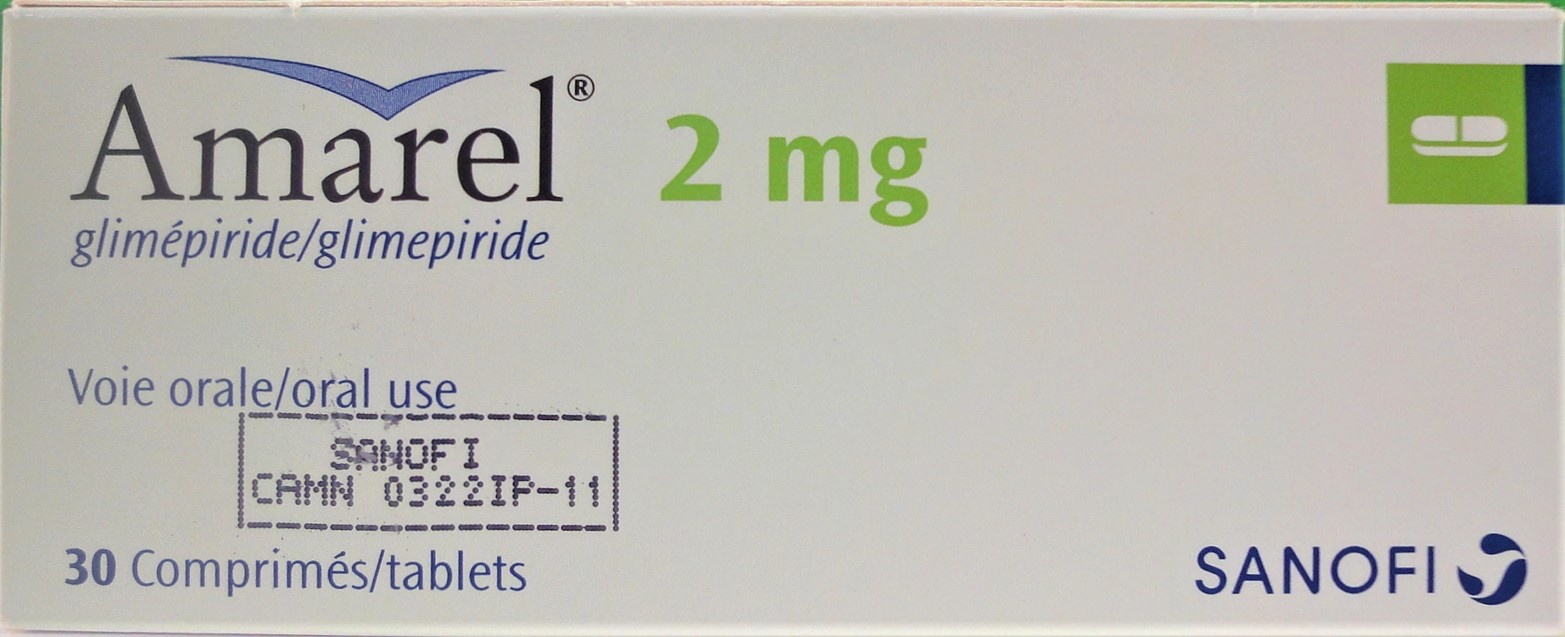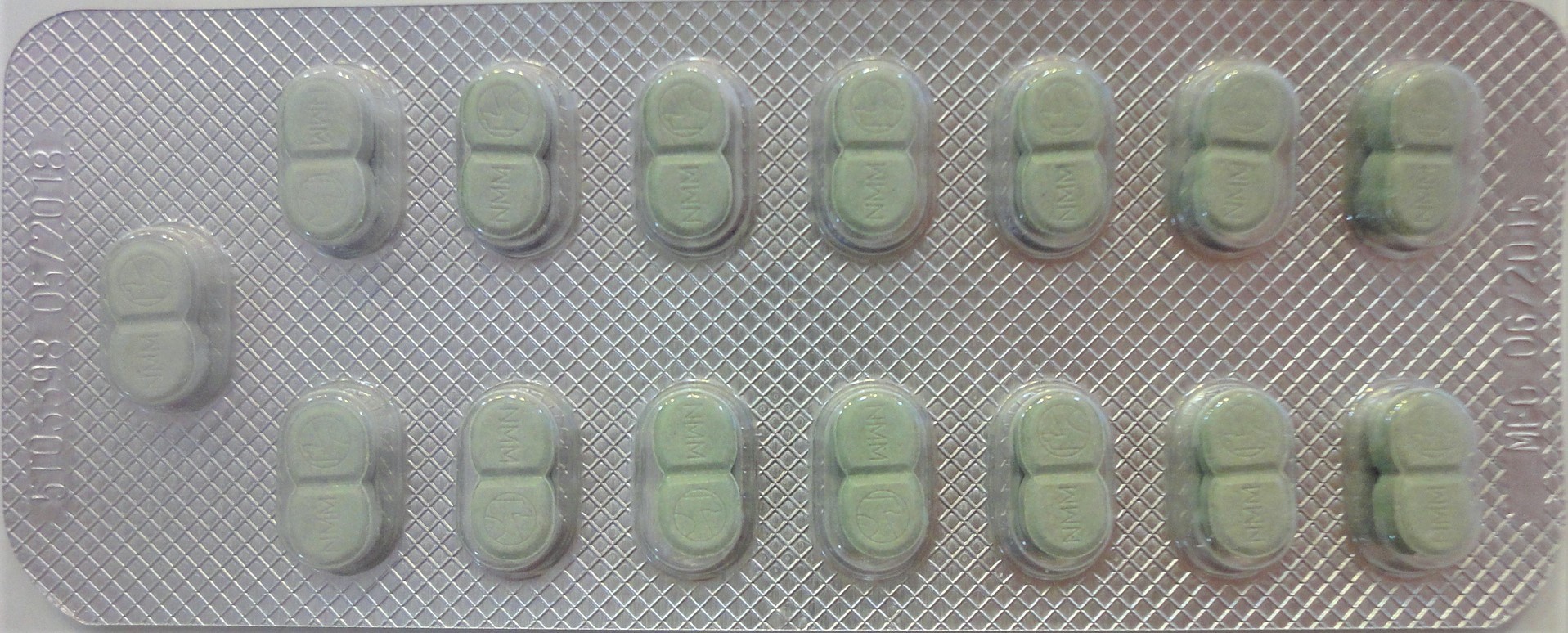AMREL Tablet
ក្រុមហ៊ុនផលិតឱសថ:
Sanofi Winthrop Industrie, France
ក្រុមហ៊ុនចែកចាយឱសថនៅប្រទេសកម្ពុជា:
ALLIANCE PHARMA CAMBODGE


- សារធាតុសកម្ម
- ប្រសិទ្ធិភាពព្យាបាល និង កម្រិតប្រើប្រាស់
- ហាមប្រើ
- ផលរំខាន
- អន្តរប្រតិកម្ម
- ស្ត្រីមានផ្ទៃពោះ និង ស្ត្រីបំបៅដោះកូន
- ការប្រុងប្រយ័ត្នជាពិសេស
- សកម្មភាពឱសថ បរិយាយប័ណ្ណឱសថ
-
សារធាតុសកម្ម
1. AMAREL 1mg:
Glimepiride 1mg
2. AMAREL 2mg:
Glimepiride 2mg
3. AMAREL 3mg:
Glimepiride 3mg
4. AMAREL 4mg:
Glimepiride 4mg
-
ប្រសិទ្ធិភាពព្យាបាល និង កម្រិតប្រើប្រាស់
It is used to treat type 2 diabetes mellitus when diet, physical exercise and weight loss alone have not been enough to control the blood sugar level.
The dose depends on your needs, and is determined by your doctor, based on the results of blood and urine sugar tests.
Do not take more tablets than your doctor has prescribed.
- The usual starting dose is 1mg once a day.
- If necessary, may increase the dose after 1-2 weeks of treatment.
- The maximum recommended dose is 6mg per day.
- A combination therapy of glimepiride plus metformin or of glimepiride plus insulin may be started. In this case, your doctor will determine the doses of glimepiride, metformin or insulin that you require.
- Your dose may need to be adjusted if you change your weight, change your lifestyle, or if you are under a lot of stress. You should therefore speak to your doctor if any of these situations apply to you.
- If you feel that the effect of your medicine is too weak or too strong, do not change the dose yourself, but ask your doctor.
-
ហាមប្រើ
Do not take Amarel if: - you are allergic to glimepiride or other sulfonylureas, Sulfonamide antibiotics.
- you have type 1 diabetes.
- you have diabetic ketoacidosis.
- you are in diabetic coma.
- you have a serious kidney disease.
- you have a serous liver disease.
-
ផលរំខាន
- Allergic reactions (including inflammation of blood vessels, often with skin rash),which may develop into serious reactions with difficulty breathing, fall in blood pressure and even shock.
- Abnormal liver function including yellowing of the skin and eyes (jaundice), bile flow problems (cholestasis), inflammation of the liver (hepatitis) or liver failure;
- Allergy (hypersensitivity) of the skin such as itching, rash, hives and increased sensitivity to sun. Some mild allergic reactions may develop into serious reactions.
- Severe hypoglycemia including loss of consciousness, seizures or coma. Some patients experienced the following side effects while taking AMAREL:
Rare side effects (may affect up to 1 in 1000 people):
- Hypoglycemia
- Decrease in the number of blood cells: blood platelets, white blood cells, red blood cells
These problems generally get better after you stop taking AMAREL.
Very rare side effects (may up to 1 in 10,000 people):
- Allergic reactions (including inflammation of blood vessels, often with skin rash), which may develop into serious reactions with difficulty breathing, fall in blood pressure and even shock. If you experience any of these symptoms, tell your doctor immediately.
- jaundice, cholestasis, hepatitis or liver failure. If you experience any of these symptoms, tell your doctor immediately.
- Nausea, vomiting, diarrhea, feeling full or bloated, or abdominal pain.
- Decrease in the amount of sodium in your blood (shown by blood tests).
Other side effects include:
- Allergy (hypersensitivity) of the skin may occur such as itching, rash, hives and increased sensitivity to sun. Some mild allergic reactions may develop into serious reactions with breathing or swallowing problems, swelling of your lips , throat or tongue. Therefore if you experience any of these side effects, tell your doctor immediately.
- Allergic reactions with antibacterial sulfonylureas, sulfonamides, or related medicines may occur.
- Problems with your vision may occur when beginning treatment with AMAREL. This is due to changes in blood sugar levels and should improve quickly.
- Elevated liver enzymes.
- Unusual, heavy blooding or bruising.
-
អន្តរប្រតិកម្ម
The following medicines can increase the blood-sugar-lowering effect of this medicine.
This can lead to a risk of hypoglycemia:
- other medicines to treat diabetes mellitus (such as insulin or metformin),
- medicines to treat pain and inflammation (Phenylbutazone, azopropazone, oxyphenbutazone, aspirin),
- medicines to treat urinary infections (such as some long-acting antibacterial sulfonamides),
- medicines to treat bacterial and fungal infections (tetracyclines, chloramphenicol, fluconazole, miconazole, quinolones, clarithromycin),
-medicines to inhibit blood clotting (Vitamin K antagonists that are coumarin derivatives such as warfarin),
- medicines supporting muscle build-up (anabolics),
- medicines used for male sex hormone replacement therapy,
- medicines to treat depression (fluoxetine, MAO-inhibitors),
- medicines lowering high cholesterol levels (fibrates),
- medicines lowering high blood pressure (ACE inhibitors),
- medicines called anti-arrhythmic agents used to control abnormal heart beat (disopyramide),
- medicines to treat gout (allopurinol, probenecid, sulfinpyrazone),
- medicines to treat cancer (cyclophosphamide, ifosfamide, trofosfamide),
- medicines used to reduce weight (fenfluramine),
- medicines used to increase circulation when given in a high dose intravenous infusion (pentoxifylline),
- medicines to treat nasal allergies such as hay fever (tritoqualine),
- medicines called sympatholytics to treat high blood pressure, heart failure or prostate disorder symptoms.
The following medicines may decrease the blood sugar lowering effect of AMAREL.
This can lead to a risk of hyperglycemia:
- medicines containing female sex hormones (estrogens, progestogens),
- medicines promoting urine production (thiazide diuretics),
- medicines used to stimulate the thyroid gland (such as levothyroxine),
- medicines to treat allergies and inflammation (glucocorticoids),
- medicines to treat severe mental disorders (chlorpromazine and other phenothiazine derivatives),
- medicines used to raise heart rate, to treat asthma or nasal congestion, coughs and colds, used to reduce weight, or used in life-threatening emergencies (adrenaline and sympathomimetics),
- medicines to treat high cholesterol levels (nicotinic acid),
- medicines to treat constipation (laxatives) when they are used long term;
- medicines to treat epilepsy (phenytoin),
- medicines to treat nervousness and sleep problems (barbiturates),
- medicines to treat increased pressure in the eye (acetazolamide),
- medicines to treat high blood pressure or low blood sugar (diazoxide),
- medicines to treat infections, tuberculosis (rifampicine),
- medicines to treat severe low blood sugar levels (glucagon).
The following medicines can increase or decrease the blood sugar lowering effect of AMAREL:
- medicines to treat stomach ulcers (called H2 antagonists),
- medicines to treat high blood pressure or heart failure such as beta-blockers, clonidine, guanethidine and reserpine. These can also hide the signs of hypoglycemia, so special care is needed when taking these medicines.
AMAREL may either increase or decrease the effects of the following medicines:
- medicines inhibiting blood clotting (Vitamin K antagonists that are coumarin derivatives such as warfarin),
- colesevelam , a medicine used to reduce cholesterol, has an effect on the absorption of AMAREL. To avoid this effect, you should take AMAREL at least 4 hours before colesevelam.
With food, drink and alcohol
Alcohol intake may increase or decrease blood sugar levels, thereby weakening the effect of AMAREL in an unpredictable way.
-
ស្ត្រីមានផ្ទៃពោះ និង ស្ត្រីបំបៅដោះកូន
Pregnancy
Should not taken during pregnancy. Tell your doctor if you are pregnant, or are planning to have a baby.
Breast-feeding
AMAREL can pass into breast milk. AMAREL should not be taken during breast-feeding. Ask your doctor or pharmacist for advise before taking any medicine.
-
ការប្រុងប្រយ័ត្នជាពិសេស
Talk to your doctor or pharmacist before taking AMAREL if:
- You are recovering from an injury, surgery, infection with fever, or from any other forms of stress. Inform your doctor, as a temporary change of treatment may be necessary.
- You have a serious liver disease.
Lowering of the hemoglobin level and breakdown of red blood cells (hemolytic anemia) can occur in patients missing the enzyme glucose-6- phosphate dehydrogenase (G6PD, a hereditary disease affecting red blood cells).
The information available on the use of AMAREL in patients under 18 years of age is limited. Therefore, its use in these patients is not recommended.
Important information about hypoglycemia (low blood sugar)
When you take AMAREL, you may get hypoglycemia (low blood sugar).
The following factors could increase the risk of you getting hypoglycemia:
- Undernourishment, irregular meal times, missed or delayed meals or a period of fasting.
- Changes to your diet.
- Taking more AMAREL than needed.
- Having kidneys that do not work properly.
- Having a serious liver disease.
- If you have any particular hormone-induced disorders (disorders of the thyroid gland, pituitary gland or adrenal cortex);
- Drinking alcohol (especially when you skip a meal).
- Taking certain other medicines.
- If you increase the amount of exercise you do, you do not eat enough or eat food containing less carbohydrates than usual.
Signs of hypoglycemia include:
- Hunger pangs, headache, nausea, vomiting, apathy, sleepiness, problems sleeping, restlessness, aggression, problems with concentration, reduced alertness and reaction time, depression, confusion, problems with your speech and vision, difficulty articulating, shakiness, partial paralysis, sensory disturbances, dizziness, helplessness.
- The following signs may also occur, heavy sweating, clammy skin, anxiety, increased heart beat, high blood pressure, palpitations, sudden strong pain in the chest that may spread outside the chest (angina pectoris and cardiac arrhythmias).
If blood sugar levels continue to drop, you may experience: considerable confusion (delirium), seizures, loss of self control, shallow and quick breathing, slowed heart beat, or loss of consciousness. Severe hypoglycemia may also resemble a stroke.
Laboratory tests
The level of sugar in your blood or urine should be checked regularly. Your doctor may also prescribe blood tests to monitor your blood cell count and liver function.
Children and adolescents
AMAREL is not recommended for use in children under 18 years of age.
-
សកម្មភាពឱសថ
P+M21:S21harmacotherapeutic group
anantidiabetic taken by mouth to help lower blood sugar. It belongs to a group of medicines called sylfonylureas.
Therapeutic indications
AMAREL works by increasing the amount of insulin released from pancreas. The insulin then lowers blood sugar levels.
*ព័ត៌មានឱសថត្រូវបានរៀបរៀងដោយ អ៊ីម៉ាតុគឹ មេឌីក (ខេមបូឌា) ដោយផ្អែកលើប្រភពព័ត៌មានខាងក្រោម។ សម្រាប់ព័ត៌មានលម្អិត សូមស្វែងរកនៅក្នុងក្រដាសព័ត៌មាននៃឱសថនីមួយៗ ឬ សាកសួរទៅកាន់ក្រុមហ៊ុនឱសថឬតំណាងចែកចាយនៃឱសថនីមួយៗ។
ប្រភពព័ត៌មាន៖
- ក្រដាសព័ត៌មាននៃឱសថសម្រាប់អ្នកជំនាញវេជ្ជសាស្ត្រដែលប្រើប្រាស់នៅប្រទេសជប៉ុន (Pharmaceutical and Medical Devices Agency, Pmda): https://www.pmda.go.jp
- ព័ត៌មានសង្ខេបនៃឱសថសម្រាប់អ្នកជំងឺដែលប្រើប្រាស់នៅប្រទេសជប៉ុន: http://www.rad-ar.or.jp
